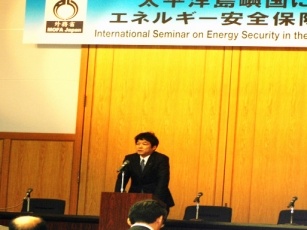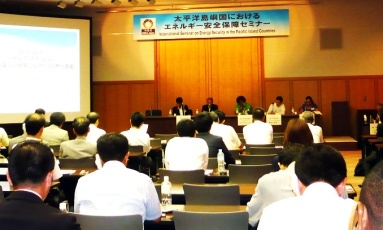Energy
"International Seminar on Energy Security in the Pacific Island Countries" -Japan's Contribution for Optimum Use of Renewable Energy in Island Areas System- (Summary and Evaluation)
1. Summary


- (1) The Ministry of Foreign Affairs of Japan (MOFA), hosted the “International Seminar on Energy Security in the Pacific Island Countries” in Tokyo in June 18. (Program.(PDF)
 ) This seminar was attended by approximately 150 people that include those from the government and relevant agencies, energy-related companies, research institutes, embassies and news media.
) This seminar was attended by approximately 150 people that include those from the government and relevant agencies, energy-related companies, research institutes, embassies and news media. - (2) H.E. Mr. Kentaro Sonoura, Parliamentary Vice-Minister for Foreign Affairs, delivered an opening address on behalf of MOFA, followed by remarks from Mr. Masakazu Ichikawa, Vice-President of Japan International Cooperation Agency (JICA), and Mr. Hisashi Hoshi, Board Member, Director, New and Renewable Energy & International Cooperation Unit, The Institute of Energy Economics, Japan (IEEJ).
- (3) In light of growing importance of renewable energy at home and abroad, MOFA hosted this seminar as a part of Japan’s international cooperation in the field of renewable energy, as Japan has assumed the presidency of the Assembly of the International Renewable Energy Agency (IRENA) and hosted the 7th Pacific Islands Leaders Meeting (PALM7) in 2015.
2. Overview of Each Session
(1) Session 1:Current Energy Situation in the Pacific Island Countries
- Ms. Makereta Lomaloma Sauturaga, Energy Efficiency Advisor, Secretariat of the Pacific Community (SPC) (PDF)

Introducing the national and regional collaboration among the Pacific Island Countries (PICs) in the field of energy, Ms. Sauturaga explained current status of energy-mix and policy target of renewable energy ratio in each country. She also pointed out that some differences exist among the PICs because of energy circumstances of each country such as electrification rate, grid connection status and dependency of fossil fuel. - Ms. Silia Kilepoa Ualesi, Pacific Coordinator, IRENA (PDF)

Ms. Ualesi introduced the recent progress regarding the grid stability study, bio-fuel utilization and regulation issues in the PICs. She explained challenges that islands countries have faced such as their remote and isolated location, uniqueness of using renewables among each island countries, and relatively small size of projects. - Mr. Graham Steven Esau, Deputy CEO, Tonga Power Limited, Finance Division (PDF)
 and
and
- Mr. Sherwin Wasai, Renewable Energy Specialist, Palau Public Utilities Corporation, Renewable Energy Division (PDF)
 Mr. Esau and Mr. Wasai, from the standpoint of power supply business in PICs, introduced the electricity supply-demand situations and examples of renewable energy projects in their countries. They expressed their resolve to increase a share of renewable energy in mid & long-term perspective toward the enhancement of energy access.
Mr. Esau and Mr. Wasai, from the standpoint of power supply business in PICs, introduced the electricity supply-demand situations and examples of renewable energy projects in their countries. They expressed their resolve to increase a share of renewable energy in mid & long-term perspective toward the enhancement of energy access.
(2) Session 2:Potential of Japan’s Contribution (Technical Cooperation, Finance, Resilience, Flexible Response to Various Environment)
- Dr. Kaoru Yamaguchi, Senior Research Fellow, Manager, New and Renewable Energy Group, New and Renewable Energy & International Cooperation Unit, IEEJ (PDF)

Dr. Yamaguchi suggested that Japan’s past experiences of R&D in renewable energy technologies would contribute to energy security in the PICs such as decreasing dependency on fossil fuel, securing energy diversity and establishing a resilient energy system. He pointed out that the technology to protect energy infrastructures from natural disasters is becoming important for the PICs. He also pointed out that the introduction of renewable energy requires the involvement of the government which has the long-term perspective finance and that Japan can support a human resource development in the PICs by utilizing its past experience as an inland country. - Mr. Akira Matsunaga, Director Team 1, Energy and Mining Group, Industrial Development and Public Policy Department, JICA (PDF)

Mr. Matsunaga introduced the distributed power system projects which JICA has implemented in the PICs. He pointed out unique challenges that the PICs have faced such as expensive fossil fuel and effects from intermittent renewable energy. He also introduced a plan of “Hybrid Island Initiative” by JICA, which will help stabilize power supply by combining renewable energy and an advanced diesel-engine which can keep high-efficiency in partial load. - Mr. Kazuyuki Takada, Deputy Director, Smart Community Department, The New Energy and Industrial Technology Development Organization (NEDO) (PDF)
 Mr. Takada introduced that the gas engine which was built for the demonstration project, ”Micro grid in Sendai”, successfully functioned to generate electricity and supply power to an adjacent hospital within 24hrs after the huge earthquake in 2011. He also introduced the demonstration project in Maui, Hawaii, in which a power from renewable energy (wind & solar) is supplied for charging electric vehicles.
Mr. Takada introduced that the gas engine which was built for the demonstration project, ”Micro grid in Sendai”, successfully functioned to generate electricity and supply power to an adjacent hospital within 24hrs after the huge earthquake in 2011. He also introduced the demonstration project in Maui, Hawaii, in which a power from renewable energy (wind & solar) is supplied for charging electric vehicles. - Mr. Jeffrey A. Miller, Energy Attaché, Embassy of the United States of America, Director, U.S. Department of Energy Japan Office (PDF)
 Mr. Miller introduced the memorandum of cooperation regarding the ”Hawaii-Okinawa Partnership on Clean and Efficient Development and Deployment,” which includes programs in areas such as smart grid, energy efficiency in buildings, renewable energy technologies and people-to-people exchanges). He pointed out that it has contributed to further strengthening of the bilateral relationship between the U.S. and Japan through the cooperation in technology that is tailored to the climate in the PICs.
Mr. Miller introduced the memorandum of cooperation regarding the ”Hawaii-Okinawa Partnership on Clean and Efficient Development and Deployment,” which includes programs in areas such as smart grid, energy efficiency in buildings, renewable energy technologies and people-to-people exchanges). He pointed out that it has contributed to further strengthening of the bilateral relationship between the U.S. and Japan through the cooperation in technology that is tailored to the climate in the PICs. - Mr. Sadao Asato, Managing Director, Okinawa Enetech Co., Inc. (PDF)
 Mr. Asato introduced small-scale distributed energy project in Okinawa as well as its project in Thailand. He also introduced the project in Republic of the Marshall Islands, utilizing the knowledge on renewable energy which has been accumulated by Okinawa and Hawaii.
Mr. Asato introduced small-scale distributed energy project in Okinawa as well as its project in Thailand. He also introduced the project in Republic of the Marshall Islands, utilizing the knowledge on renewable energy which has been accumulated by Okinawa and Hawaii.
(3) Session 3:Panel Discussion (Direction of Japan’s Cooperation and Challenges)
| Moderator; | Dr. Yamaguchi, Senior Research Fellow, IEEJ |
| Panelists; | Ms. Sauturaga, Energy Efficiency advisor, SPC, |
| Ms. Ualesi, Pacific Coordinator, IRENA, | |
| Mr. Ogawa, Expert of International Cooperation, JICA, | |
| Mr. Takada, Deputy Director, Smart Community Department, NEDO, | |
| Mr. Asato, Managing Director, Okinawa Enetech Co., Inc. |
A. Panel Discussion
In the beginning, some panelists expressed their interests in JICA’s “Hybrid Island Initiative”, technical cooperation on clean energy between Okinawa and Hawaii and NEDO’s micro-grid system demonstration. It was emphasized that a better coordinated approach among stakeholders is important when introducing renewable energy for the PICs. With regard to energy-related information sharing in the past, it is pointed out that provision of information which fits in with the reality of each country by categorizing and indexing the knowledge. While some panelists pointed out the redundancy of projects, others stated that it is not always necessary to avoid the duplication because the effectiveness of projects varies from region to region in light of specific characteristics of each country. A participant coming from a Pacific country showed his interest in or Na-S (Sodium-Sulfur) battery, or the advanced battery system.
B. Summary
The summary of the discussions about introducing renewable energy in the PICs was as follows.
- (i) With regard to Japan’s contribution, both the hardware side support including equipment provision and software side assistance such as technical support for maintenance and operation would be effective.
- (ii) Considering the diverse aspect of the PICs, it would be necessary to demonstrate and verify a set of project in several different countries.
- (iii) Categorization and indexing of the past knowledge would provide an environment in which each pacific island country could select an appropriate option.
3. Evaluation
- (1) Practical and useful knowledge and experiences were shared among participants through professional and concrete discussions toward the promotion of renewable energy such as the potential and challenges in the PICs, expectations for private sector in financing and technology, and the necessity of collaboration among stakeholders.
- (2) In particular, detailed and concrete measures were suggested with lessons learnt from Japan’s past experiences in Okinawa and the PICs as well as its technology and knowledge that utilized these lessons. The seminar provided a fruitful occasion of discussion for the participants from the PICs to find attractiveness in Japanese companies and understand the possibility of global public-private partnership.
- (3) The seminar was attended by many people from Japanese companies, which indicated their strong interest in advancing renewable energy business in the PICs. The seminar also offered an opportunity of networking among those participated from the PICs and a private sector of Japan.


 (Open a New Window)
(Open a New Window)